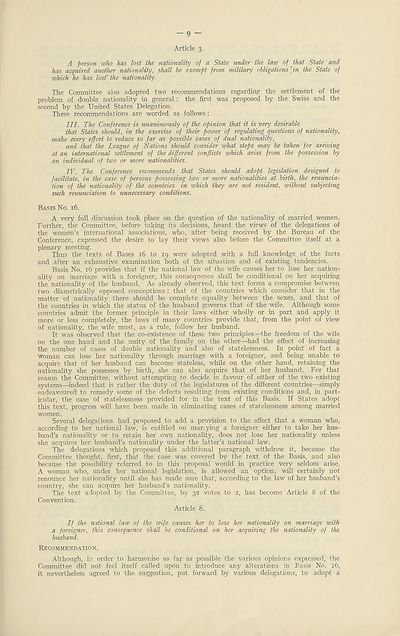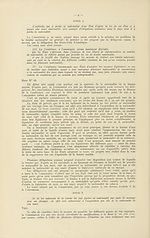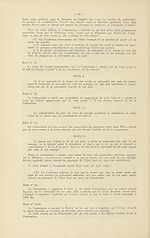Download files
Complete book:
Individual page:
Thumbnail gallery: Grid view | List view

9
Article 3.
A person who has lost the nationality of a State under the law of that State and
has acquired another nationality, shall be exempt from military obligations rin the State of
which he has losf the nationality.
The Committee also adopted two recommendations regarding the settlement of the
problem of double nationality in general : the first was proposed by the Swiss and the
second by the United States Delegation.
These recommendations are worded as follows :
III. The Conference is unanimously of the opinion that it is very desirable
that States should, in the exercise of their power of regulating questions of nationality,
make every effort to reduce so far as possible cases of dual nationality,
and that the League of Nations should consider what steps may be taken for arriving
at an international settlement of the different conflicts which arise from the possession by
an individual of two or more nationalities.
IV. The Conference recommends that States should adopt legislation designed to
facilitate, in the case of persons possessing two or more nationalities at birth, the renuncia¬
tion of the nationality of the countries in which they are not resident, without subjecting
such renunciation to unnecessary conditions.
Basis No. 16.
A very full discussion took place on the question of the nationality of married women.
Further, the Committee, before taking its decisions, heard the views of the delegations of
the women’s international associations, who, after being received by the Bureau of the
Conference, expressed the desire to lay their views also before the Committee itself at a
plenary meeting.
Thus the texts of Bases 16 to 19 were adopted with a full knowledge of the facts
and after an exhaustive examination both of the situation and of existing tendencies.
Basis No. 16 provides that if the national law of the wife causes her to lose her nation¬
ality on marriage with a foreigner, this consequence shall be conditional on her acquiring
the nationality of the husband. As already observed, this text forms a compromise between
two diametrically opposed conceptions : that of the countries which consider that in the
matter of nationality there should be complete equality between the sexes, and that of
the countries in which the status of the husband governs that of the wife. Although some
countries admit the former principle in their laws either wholly or in part and apply it
more or less completely, the laws of many countries provide that, from the point of view
of nationality, the wife must, as a rule, follow her husband.
It was observed that the co-existence of these two principles—the freedom of the wife
on the one hand and the unity of the family on the other—had the effect of increasing
the number of cases of double nationality and also of statelessness. In point of fact a
woman can lose her nationality through marriage with a foreigner, and being unable to
acquire that of her husband can become stateless, while on the other hand, retaining the
nationality she possesses by birth, she can also acquire that of her husband. For that
reason the Committee, without attempting to decide in favour of either of the two existing
systems—indeed that is rather the duty of the legislatures of the different countries—simply
endeavoured to remedy some of the defects resulting from existing conditions and, in part¬
icular, the case of statelessness provided for in the text of this Basis. If States adopt
this text, progress will have been made in eliminating cases of statelessness among married
women.
Several delegations had proposed to add a provision to the effect that a woman who,
according to her national law, is entitled on marrying a foreigner either to take her hus¬
band’s nationality or to retain her own nationality, does not lose her nationality unless
she acquires her husband’s nationality under the latter’s national law.
The delegations which proposed this additional paragraph withdrew it, because the
Committee thought, first, that the case was covered by the text of the Basis, and also
because the possibility referred to in this proposal would in practice very seldom arise.
A woman who, under her national legislation, is allowed an option, will certainly not
renounce her nationality until she has made sure that, according to the law of her husband’s
country, she can acquire her husband’s nationality.
The text adopted by the Committee, by 32 votes to 2, has become Article 8 of the
Convention.
Article 8.
If the national law of the wife causes her to lose her nationality on marriage with
a foreigner, this consequence shall be conditional on her acquiring the nationality of the
husband.
Recommendation.
Although, in order to harmonise as far as possible the various opinions expressed, the
Committee did not feel itself called upon to introduce any alterations in Basis No. 16,
it nevertheless agreed to the suggestion, put forward by various delegations, to adopt a
Article 3.
A person who has lost the nationality of a State under the law of that State and
has acquired another nationality, shall be exempt from military obligations rin the State of
which he has losf the nationality.
The Committee also adopted two recommendations regarding the settlement of the
problem of double nationality in general : the first was proposed by the Swiss and the
second by the United States Delegation.
These recommendations are worded as follows :
III. The Conference is unanimously of the opinion that it is very desirable
that States should, in the exercise of their power of regulating questions of nationality,
make every effort to reduce so far as possible cases of dual nationality,
and that the League of Nations should consider what steps may be taken for arriving
at an international settlement of the different conflicts which arise from the possession by
an individual of two or more nationalities.
IV. The Conference recommends that States should adopt legislation designed to
facilitate, in the case of persons possessing two or more nationalities at birth, the renuncia¬
tion of the nationality of the countries in which they are not resident, without subjecting
such renunciation to unnecessary conditions.
Basis No. 16.
A very full discussion took place on the question of the nationality of married women.
Further, the Committee, before taking its decisions, heard the views of the delegations of
the women’s international associations, who, after being received by the Bureau of the
Conference, expressed the desire to lay their views also before the Committee itself at a
plenary meeting.
Thus the texts of Bases 16 to 19 were adopted with a full knowledge of the facts
and after an exhaustive examination both of the situation and of existing tendencies.
Basis No. 16 provides that if the national law of the wife causes her to lose her nation¬
ality on marriage with a foreigner, this consequence shall be conditional on her acquiring
the nationality of the husband. As already observed, this text forms a compromise between
two diametrically opposed conceptions : that of the countries which consider that in the
matter of nationality there should be complete equality between the sexes, and that of
the countries in which the status of the husband governs that of the wife. Although some
countries admit the former principle in their laws either wholly or in part and apply it
more or less completely, the laws of many countries provide that, from the point of view
of nationality, the wife must, as a rule, follow her husband.
It was observed that the co-existence of these two principles—the freedom of the wife
on the one hand and the unity of the family on the other—had the effect of increasing
the number of cases of double nationality and also of statelessness. In point of fact a
woman can lose her nationality through marriage with a foreigner, and being unable to
acquire that of her husband can become stateless, while on the other hand, retaining the
nationality she possesses by birth, she can also acquire that of her husband. For that
reason the Committee, without attempting to decide in favour of either of the two existing
systems—indeed that is rather the duty of the legislatures of the different countries—simply
endeavoured to remedy some of the defects resulting from existing conditions and, in part¬
icular, the case of statelessness provided for in the text of this Basis. If States adopt
this text, progress will have been made in eliminating cases of statelessness among married
women.
Several delegations had proposed to add a provision to the effect that a woman who,
according to her national law, is entitled on marrying a foreigner either to take her hus¬
band’s nationality or to retain her own nationality, does not lose her nationality unless
she acquires her husband’s nationality under the latter’s national law.
The delegations which proposed this additional paragraph withdrew it, because the
Committee thought, first, that the case was covered by the text of the Basis, and also
because the possibility referred to in this proposal would in practice very seldom arise.
A woman who, under her national legislation, is allowed an option, will certainly not
renounce her nationality until she has made sure that, according to the law of her husband’s
country, she can acquire her husband’s nationality.
The text adopted by the Committee, by 32 votes to 2, has become Article 8 of the
Convention.
Article 8.
If the national law of the wife causes her to lose her nationality on marriage with
a foreigner, this consequence shall be conditional on her acquiring the nationality of the
husband.
Recommendation.
Although, in order to harmonise as far as possible the various opinions expressed, the
Committee did not feel itself called upon to introduce any alterations in Basis No. 16,
it nevertheless agreed to the suggestion, put forward by various delegations, to adopt a
Set display mode to:
![]() Universal Viewer |
Universal Viewer | ![]() Mirador |
Large image | Transcription
Mirador |
Large image | Transcription
Images and transcriptions on this page, including medium image downloads, may be used under the Creative Commons Attribution 4.0 International Licence unless otherwise stated. ![]()
| League of Nations > Legal > Rapport de la Première commission (Nationalité) > (17) |
|---|
| Permanent URL | https://digital.nls.uk/191514883 |
|---|
| Shelfmark | LN.V |
|---|
| Description | Over 1,200 documents from the non-political organs of the League of Nations that dealt with health, disarmament, economic and financial matters for the duration of the League (1919-1945). Also online are statistical bulletins, essential facts, and an overview of the League by the first Secretary General, Sir Eric Drummond. These items are part of the Official Publications collection at the National Library of Scotland. |
|---|---|
| Additional NLS resources: |
|

